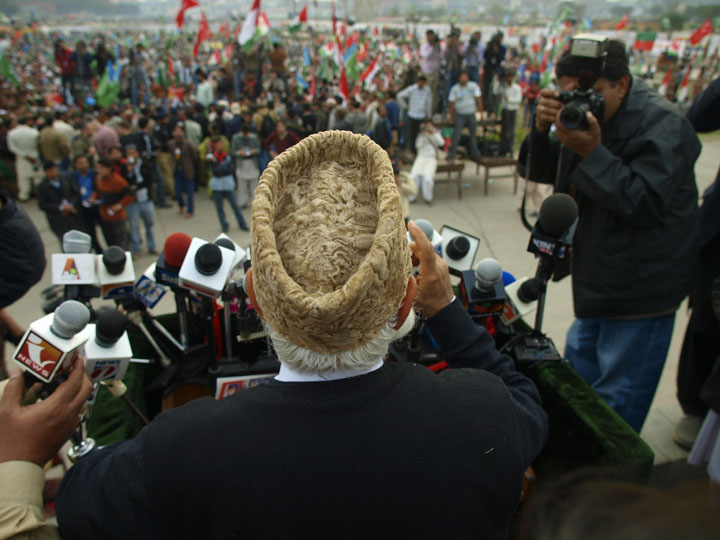
Jihadi populist Qazi Hussain Ahmad, donning his trademark ‘Jinnah cap’ (ie a Qaraqul hat made from the delicate fur of aborted lamb fetuses) while speaking in Lahore five years ago. Hussain urged his supporters to boycott voting in 2008 parliamentary elections being held in the wake of Benazir Bhutto’s assassination on December 27, 2007. ©2008 Derek Henry Flood
New York- I saw on twitter that the former Amir (leader) of Jamaat-e-Islami Pakistan, Qazi Hussain Ahmad, died in Islamabad today (technically tomorrow in Pakistan). I photographed him campaigning against the vote in the February 2008 parliamentary elections. Hussain was reciting his boilerplate firebrand rhetoric urging the constituent members of the All Parties Democratic Movement to shun any political activities that further legitimated the rule of Pervez Musharraf. Hussain riled the entirely male crowd to keep the embers of jihad alight in both Kashmir and Afghanistan.
Despite the efforts of such political luminaries like the late Qazi Hussain Ahmad and Imran Khan, two days later, the general elections were held rather quietly and with a minimum of political violence and their results maintained the feudal status quo of the country’s dynastic politics. Pakistan should theoretically be gearing up for a new round of general elections next month seeing as the events in these photos took place five years ago.
Though Hussain, a stalwart of mainstream jihadi politics in Pakistan, has now passed from the scene, his comrade in Punjabi and Pashtun politics carries on. Imran Khan continues to portray himself in English-language media outlets as a sort of neo-anti-colonialist who is altruistically trying to eject American influence from the Pakistani polity. But the mere fact that he was leading a rally that had anti-Shia extremists from Jaish-e-Muhammad and Sipah-e-Sahaba Pakistan in the mix gave me the impression he is a savvy political operator who provides Urdu-language audiences with quite a different message-if in no other way than by the visible company he keeps.
Khan is now marketing himself in the West as an anti-drone activist–fair play–but in some circles of the Pakistani intelligentsia, he is derisively referred to as “Taliban Khan” for his seeming appeasement of the Tehrik-e-Taliban Pakistan. At least with Qazi Hussain Ahmad, you always knew exactly where he stood.
But very much unlike Hussain, he ranks 3rd on The Hotlist: 20 of the Hottest Men in Pakistan!
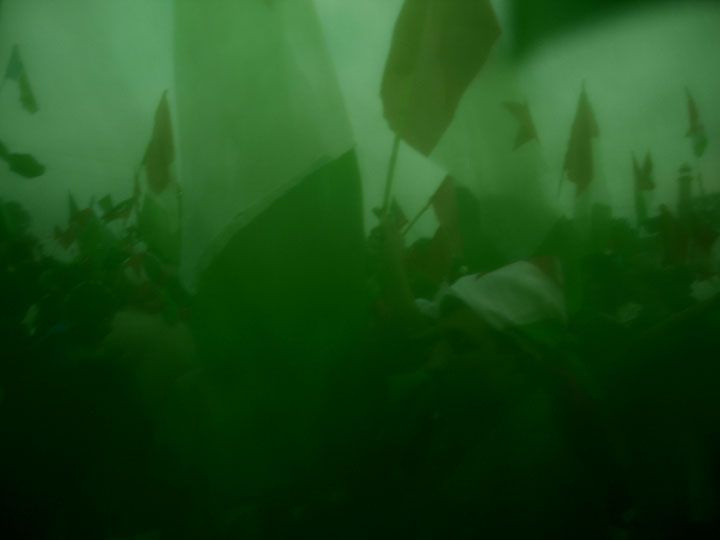
Milling in the crowd of the APDM rally at the base of he Minar-e-Pakistan (‘Tower of Pakistan’). In the crowd were hardcore anti-Shia takfiris from Jaish-e-Muhammad. Scary stuff. ©2008 Derek Henry Flood
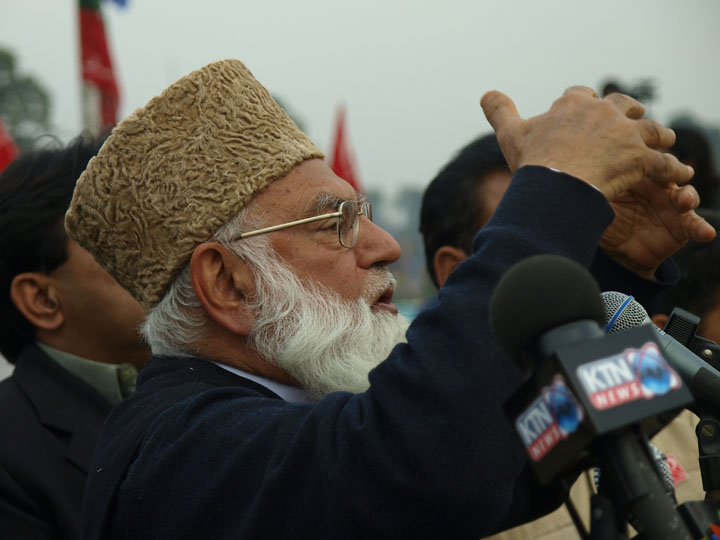
Qazi Hussain Ahmad addresses supporters at Iqbal Park in Lahore, Pakistan on February 16, 2008. ©2008 Derek Henry Flood
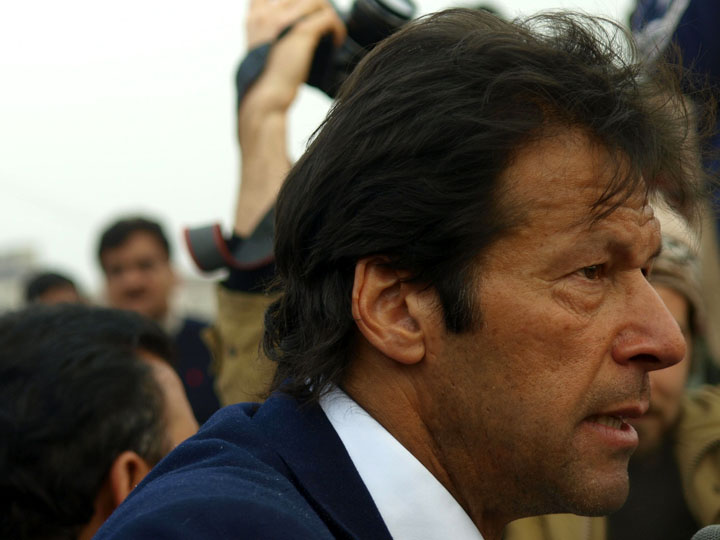
Imran Khan urging his Tehrik-e-Insaf followers to remain infuriated over violations of Pakistan’s cherished sovereignty that were allowed under the rule of Pervez Musharraf. Khan calculatingly used the combination of his fame and popular discontent during the Musharraf era to climb to the top of Pakistan’s political ladder. Khan was against many things: the Pakistan People’s Party, the Pakistan Muslim Leagues (both N and Q-though he an Qazi Hussain Ahmad appeared alongside Nawaz Sharif in a November 2007 press conference calling for the boycott), American interference in Pakistan’s internal affairs, American meddling in Afghanistan and so forth. After listening to him speak, I could not discern what precisely he stood for. ©2008 Derek Henry Flood
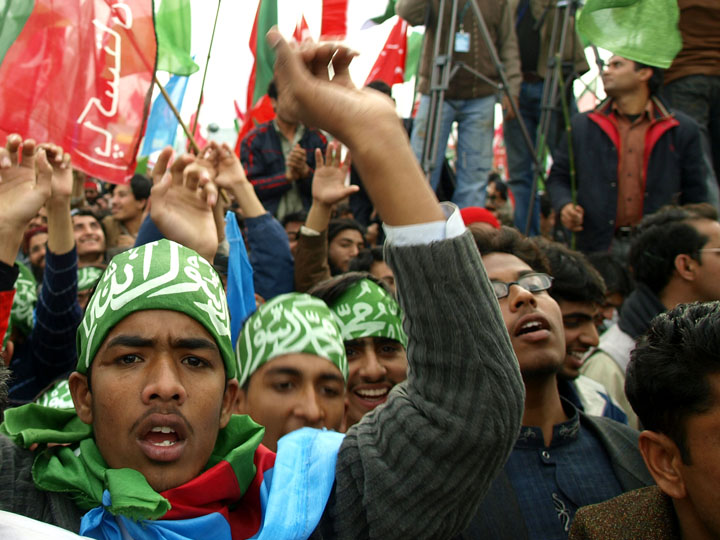
Men and boys gather to hear speakers encourage them not to vote. Apparently women did not have a place in the public sphere of Pakistan’s militant political spectrum, at least not that particular day anyway. I would also be surprised if many of the males in the park that afternoon were registered voters. ©2008 Derek Henry Flood
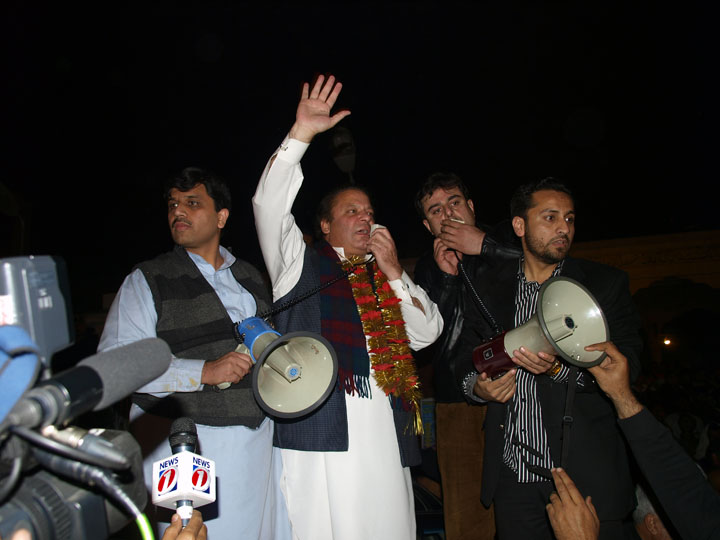
After his political opponents had their say, former Prime Minister Nawaz Sharif, apparently oblivious to threats of suicide bombers, stands atop a Punjab Police truck to rally his supporters in Lahore’s Old City before entering the Data Darbar Sufi shrine complex on February 16, 2008. Sharif is emblematic of feudal power base-style politics in South Asia. ©2008 Derek Henry Flood